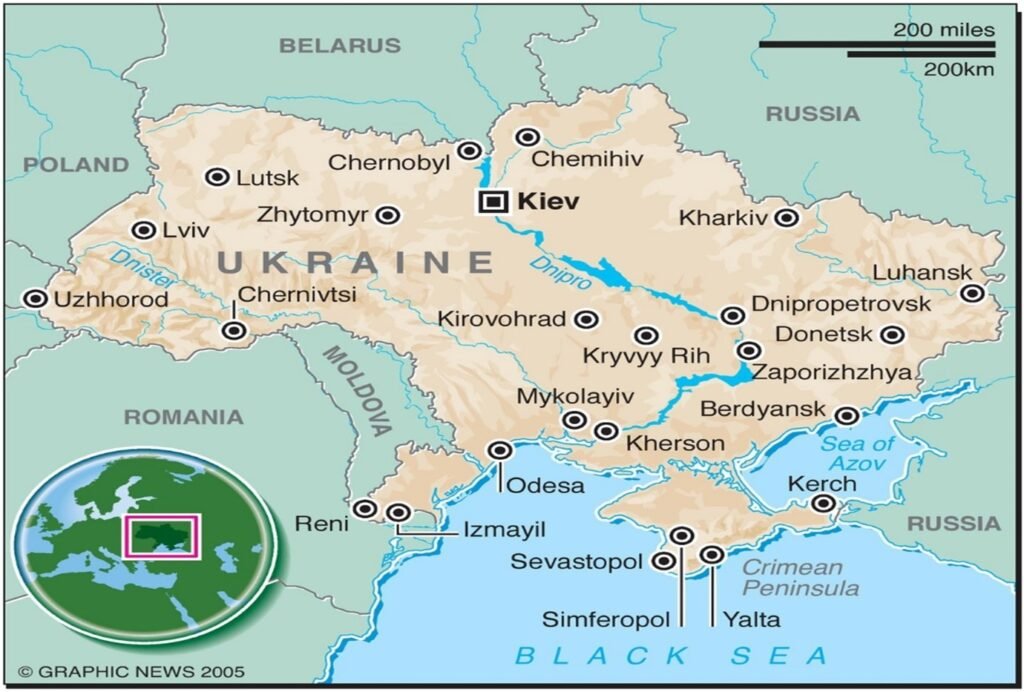(General Studies II – International Relations- Bilateral, regional and global groupings and agreements involving India and/or affecting India’s interests)
- As the war in Ukraine enters its third year, a new wave of peace diplomacy is gaining momentum, with both Russia and Ukraine showing a greater inclination toward ending the conflict.
- Russian President Vladimir Putin welcomed peace initiatives from countries like Brazil, China, and India, while Ukrainian President Volodymyr Zelenskyy has also invited leaders from the Global South to contribute to the peace process.
- India, having consistently advocated for dialogue and diplomacy since the onset of the conflict, is now presented with a potential opportunity to play a more active peacemaking role.
India’s Four-Point Principle for Peace –
Recently External Affairs Minister laid out India’s four-point principle for resolving the Russia-Ukraine conflict:
- Time for Peace: India believes that this is the right moment for peace and dialogue, emphasizing the need to stop hostilities.
- No Military Solutions: India asserts that there can be no solutions to the war on the battlefield, highlighting the futility of further escalation.
- Inclusion of Russia in Peace Talks: For any peace process to be successful, Russia must be included in the discussions, recognizing its crucial role in the conflict.
- India’s Concern and Engagement: India remains concerned and engaged in the ongoing efforts to resolve the conflict and has been consistent in its diplomatic outreach, including the National Security Adviser’s visit to Moscow for peace consultations.
These principles underline India’s consistent message that disputes cannot be resolved through war, a point reiterated during the Prime Minister’s visits to both Moscow and Kyiv. The emphasis is on diplomacy and dialogue as the only viable pathways to peace.

India’s Peace-making Potential –
- Korea and Vietnam Peace Process: India played a critical role in proposing a ceasefire and facilitating peace talks during the Korean (1950-53) and Vietnam Wars (1955-75). India has huge experience in contributing to ending Global hostilities.
- Strong Relations with Russia: India’s long-standing ties with Russia give it leverage to engage Moscow in meaningful discussions, potentially encouraging Russia towards negotiations.
- Global Influence: As a rising global power and a leader in the Global South, India’s involvement can bring new perspectives to the conflict resolution process.
- Assessment of Previous Efforts: India could draw lessons from recent peace diplomacy efforts, such as Hungarian Prime Minister Viktor Orban’s initiatives, which involved direct talks with major actors including Putin, the Chinese President and former US President.
- Peace Fatigue in Europe: Although Europe has voiced strong support for Ukraine, internal divisions are emerging, with some factions advocating for reconciliation with Russia. This presents both opportunities and challenges for India’s involvement in peace talks.
- Geopolitical Impact on India: Major wars like the Ukraine conflict often lead to a reorganization of regional and global orders. A new security arrangement in Europe would have a direct impact on India’s foreign relations and global positioning.
- Impact on India’s Economic and Security Policies: The ongoing war in Ukraine has created economic and security challenges for India, making the restoration of peace a critical objective. A stable Europe would allow India to focus on its economic growth and ensure security in the broader Asian region.
| Global Players in the Ukraine-Russia Conflict • United States and NATO: The United States and NATO have been key supporters of Ukraine, providing extensive military, financial, and humanitarian aid since Russia’s invasion in 2022. They have imposed severe sanctions on Russia, aiming to weaken its war capabilities and isolate it diplomatically. • European Union: The European Union has joined the U.S. in imposing sanctions on Russia and offering significant aid to Ukraine. EU countries have also provided military assistance, with some members advocating for a stronger defence policy in response to the conflict. • China: China maintains a neutral stance, advocating for peaceful dialogue without explicitly condemning Russia. Beijing balances its strategic partnership with Moscow and its economic ties with the West, emphasizing a non-interventionist approach. • United Nations: The United Nations has called for an immediate ceasefire and peaceful negotiation. However, its efforts are constrained by divisions within the Security Council, particularly between Russia and Western powers, limiting its capacity to mediate. |
As peace talks gain traction, India must carefully navigate its diplomatic engagements and contribute to the broader global effort to restore stability in Europe, ensuring it remains a key player in the evolving global order. India’s commitment to maintaining dialogue and fostering diplomacy could become increasingly influential in helping to resolve one of the most significant global conflicts of recent times.

